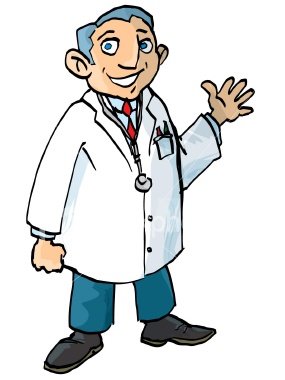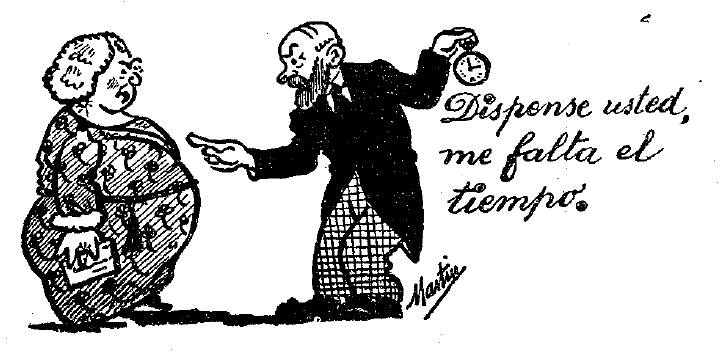
| Языки :: Испанский |
| Аудио |

 |
|
 |
|
15 |
Español |
Spanish |
| Lección Sexta (6ͣ) | ||
| Adiós, doctor | Good bye, doctor | |
| (Continuación de la lección quinta.) | (sequel to the 5th lesson). | |
| 1 | ¿Dice cuando vendrá? | Does (he) say when (he) comes [will come] ? |
| 2 | Mañana, y dice que tiene una buena noticia. | To-morrow, and (he) says that (he) has [holds] [a] good news. |
| 3 | ¿Regresara en el tren de la tarde? (1). | Will (he) come back by [in] the afternoon train? |
| 4 | No lo dice, pero parece seguro. | (He does) not say it, but (it) looks certain. |
| 5 | Muy bien; iré a la estación (2). Adiós doña Clara, |
Very well; (I) will go to the station. Good bye, Mrs. Clara. |
| 6 | ¿Se marcha usted tan pronto? | Do you leave [march him your Honour] so quickly? |
| 7 | Dispense; me falta tiempo. | Excuse (me); I lack time [time fails me]. |
| 8 |
Adiós, doctor. (Doña Clara, sola) : |
Good bye, doctor.
Mrs. Clara, alone : (He) is an excellent doctor, but what (a) yokel! |
| EXERCISE : | ||
| 1 | El doctor tiene mucho dinero. | The doctor has much money. |
| 2 | Tu amigo no ha podido venir. | Your friend has not been able to come. |
| 3 | ¿Viene usted a la estación? | Do you [does your H.] come to the station? |
| 4 | ¿Tiene usted tiempo ahora? |
Have you [has your H.] time now? |
| 5 | ¿Qué dice doña Clara? | What (does) Dona Clara say? |
| 6 | ¿Qué dice usted? | What (do) you [your H.] say? |
| 7 |
Mi marido parece triste (treesty). |
My husband looks sad. |
| 8 | Usted parece triste. | You [your H.] looks sad. |
| NOTES. | |
| 1 | La tarde : the afternoon, same word as tarde, late. |
| 2 |
La estación: the station; you will also see :
la estatua, the statue; |
| 3 | Mind the pronunciation of excelente. |
|
Let us make it clear that has is ha when an auxiliary and
tiene in the other cases. Thus : Carlos ha visto París : Charles has seen Paris (to have, auxiliary); Carlos tiene un amigo : Charles has a friend (to have, possess). And, since, to say you (singular) we use the 3rd person : Usted me ha permitido : you have [your H. has] permitted me..., and Usted tiene mi dinero, you have my money. |
|
|
These are very small difficulties which won't resist a few days'
practice; |
